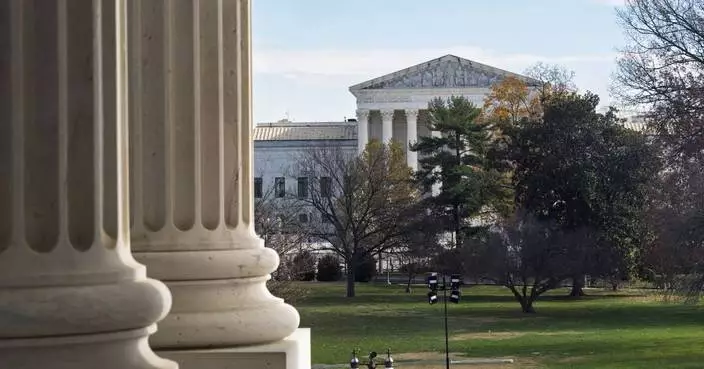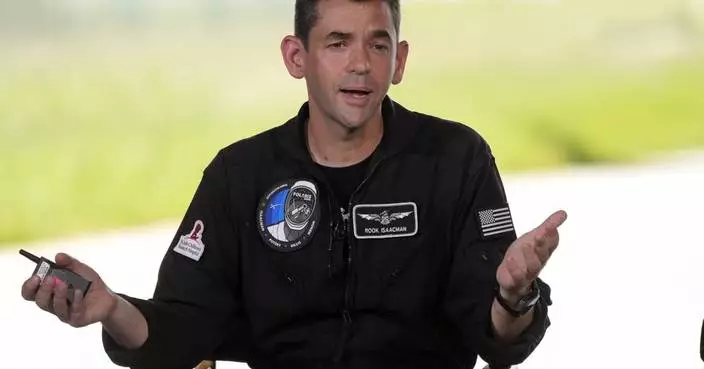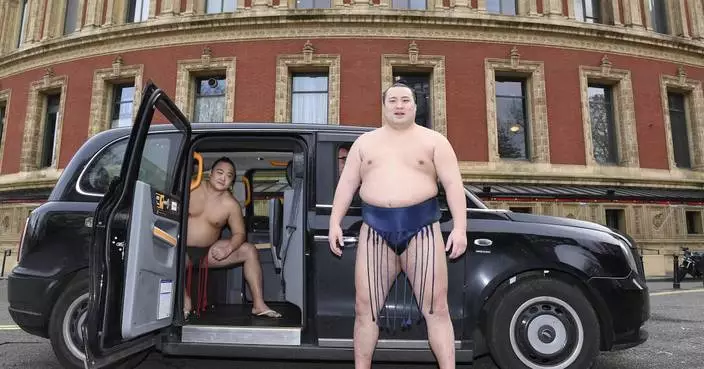It is an ambitious social experiment of our moment in history — one that experts say could accomplish something that parents, schools and other governments have attempted with varying degrees of success: keeping kids off social media until they turn 16.
Australia's new law, approved by its Parliament last week, is an attempt to swim against many tides of modern life — formidable forces like technology, marketing, globalization and, of course, the iron will of a teenager. And like efforts of the past to protect kids from things that parents believe they're not ready for, the nation's move is both ambitious and not exactly simple, particularly in a world where young people are often shaped, defined and judged by the online company they keep.
The ban won't go into effect for another year. But how will Australia be able to enforce it? That's not clear, nor will it be easy. TikTok, Snapchat and Instagram have become so ingrained in young people's lives that going cold turkey will be difficult.
Other questions loom. Does the ban limit kids' free expression and — especially for those in vulnerable groups — isolate them and curtail their opportunity to connect with members of their community? And how will social sites verify people's ages, anyway? Can't kids just get around such technicalities, as they so often do?
This is, after all, the 21st century — an era when social media is the primary communications tool for most of those born in the past 25 years who, in a fragmented world, seek the common cultures of trends, music and memes. What happens when big swaths of that fall away?
Is Australia's initiative a good, long-time-coming development that will protect the vulnerable, or could it become a well-meaning experiment with unintended consequences?
The law will make platforms including TikTok, Facebook, Snapchat, Reddit, X and Instagram liable for fines of up to 50 million Australian dollars ($33 million) for systemic failures to prevent children younger than 16 from holding accounts. “It’s clear that social media companies have to be held accountable, which is what Australia is trying to do,” said Jim Steyer, president and CEO of the nonprofit Common Sense Media.
Leaders and parents in countries around the world are watching Australia’s policy closely as many seek to protect young kids from the internet's dangerous corners — and, not incidentally, from each other. Most nations have taken different routes, from parental consent requirements to minimum age limits.
Many child safety experts, parents and even teens who have waited to get on social media consider Australia's move a positive step. They say there’s ample reason to ensure that children wait.
“What’s most important for kids, just like adults, is real human connection. Less time alone on the screen means more time to connect, not less," said Julie Scelfo, the founder of Mothers Against Media Addiction, or MAMA, a grassroots group of parents aimed at combatting the harms of social media to children. “I’m confident we can support our kids in interacting in any number of ways aside from sharing the latest meme.”
The harms to children from social media have been well documented in the two decades since Facebook’s launch ushered in a new era in how the world communicates. Kids who spend more time on social media, especially when they are tweens or young teenagers, are more likely to experience depression and anxiety, according to multiple studies — though it is not yet clear if there is a causal relationship.
What's more, many are exposed to content that is not appropriate for their age, including pornography and violence, as well as social pressures about body image and makeup. They also face bullying, sexual harassment and unwanted advances from their peers as well as adult strangers. Because their brains are not fully developed, teenagers, especially younger ones the law is focused on, are also more affected by social comparisons than adults, so even happy posts from friends can send them into a negative spiral.
Many major initiatives, particularly those aimed at social engineering, can produce side effects — often unintended. Could that happen here? What, if anything, do kids stand to lose by separating kids and the networks in which they participate?
Paul Taske, associate director of litigation at the tech lobbying group NetChoice, says he considers the ban “one of the most extreme violations of free speech on the world stage today" even as he expressed relief that the First Amendment prevents such law in the United States
"These restrictions would create a massive cultural shift,” Taske said.
“Not only is the Australian government preventing young people from engaging with issues they’re passionate about, but they’re also doing so even if their parents are ok with them using digital services," he said. "Parents know their children and their needs the best, and they should be making these decisions for their families — not big government. That kind of forcible control over families inevitably will have downstream cultural impacts.”
David Inserra, a fellow for Free Expression and Technology, Cato Institute, called the bill “about as useful as an ashtray on a motorbike” in a recent blog post. While Australia's law doesn't require “hard verification” such as an uploaded ID, he said, it calls for effective “age-assurance” that includes an array of ways companies can estimate someone's age. He said no verification system can ensure accuracy while also protecting privacy and not impacting adults in the process.
Privacy advocates have also raised concerns about the law's effect on online anonymity, a cornerstone of online communications — and something that can protect teens on social platforms.
“Whether it be religious minorities and dissidents, LGBTQ youth, those in abusive situations, whistleblowers, or countless other speakers in tricky situations, anonymous speech is a critical tool to safely challenge authority and express controversial opinions,” Inserra said. “But if every user of online platforms must first identify themselves, then their anonymity is at risk.”
Parents in Britain and across Europe earlier this year organized on platforms such as WhatsApp and Telegram to promise not to buy smartphones for children younger than 12 or 13. This approach costs almost no money and requires no government enforcement. In the United States, some parents are keeping kids off social media either informally or as part of an organized campaign such as Wait Until 8th, a group that helps parents delay kids' access to social media and phones.
This fall, Norway announced plans to ban kids under 15 from using social media, while France is testing a smartphone ban for kids under 15 in a limited number of schools — a policy that could be rolled out nationwide if successful.
U.S. lawmakers have held multiple congressional hearings — most recently in January — on child online safety. Still, the last federal law aimed at protecting children online was enacted in 1998, six years before Facebook’s founding. In July, the U.S. Senate overwhelmingly passed legislation designed to protect children from dangerous online content, pushing forward with what would be the first major effort by Congress in decades to hold tech companies more accountable. But the Kids Online Safety Act has since stalled in the House.
While several states have passed laws requiring age verification, those are stuck in court. Utah became the first state to pass laws regulating children’s social media use in 2023. In September, a judge issued the preliminary injunction against the law, which would have required social media companies to verify the ages of users, apply privacy settings and limit some features. NetChoice has also obtained injunctions temporarily halting similar laws in several other states.
And last May, U.S. Surgeon General Vivek Murthy said there is insufficient evidence to show social media is safe for kids. He urged policymakers to address the harms of social media the same way they regulate things like car seats, baby formula, medication and other products children use.
Said Scelfo: “Why should social media products be any different? Kids may try to get around the restrictions — just like they do for alcohol, tobacco or drugs — but nobody is saying that because they try, we should give them unfettered access to them. Parents cannot possibly bear the entire responsibility of keeping children safe online, because the problems are baked into the design of the products. And so we need policies that hold Big Tech accountable for ensuring their products are safe.”
Associated Press Writer Laurie Kellman contributed to this story.

A teenager uses his mobile phone to access social media, Sydney, Wednesday, Nov. 13, 2024. (Dean Lewins/AAP Image VIA AP)
The Supreme Court heard arguments on Wednesday in just its second major transgender rights case, a challenge to a Tennessee law that bans gender-affirming care for minors.
The nation’s top court will weigh whether Tennessee’s law violates the equal protection clause of the 14th Amendment, requiring that people in similar circumstances be treated the same under the law. Both sides in the case say they are acting to protect minors from harm.
At least 26 states have adopted laws restricting or banning such care for minors, and most of those states face lawsuits.
Here's the latest:
The arguments in front of the justices wrapped up after more than two hours.
“Our fundamental point is there is no sex-based line here,” Rice said.
Rice argued that the Tennessee law is instead aimed at the purpose of the treatment.
Children can get puberty blockers to treat early onset puberty, but not as a treatment for gender dysphoria.
Justice Amy Coney Barrett asked Tennessee Solicitor General Matt Rice about the possible impact of both laws restricting women and girls from women’s and girls’ sports competitions — and those that keep them out of women’s and girls’ bathrooms in schools or other public buildings.
At least 24 states have sports laws. At least 11 have bathroom laws.
The court’s three liberal justices seem firmly on the side of the Biden administration and the families who are challenging the Tennessee law.
But it’s not clear that any of the court’s six conservatives will go along.
Five conservatives have voiced varying degrees of skepticism of the challengers’ arguments. Gorsuch has yet to say anything.
Tennessee Solicitor General Matt Rice is now before the court to defend the state’s law, following the conclusion of ACLU attorney Chase Strangio’s time at the podium.
Justice Amy Coney Barrett earlier had asked if there were examples of “de jure,” or by law, discrimination against transgender people rather than private discrimination.
Strangio cited laws against cross-dressing and previous bans on military service by transgender people.
President Joe Biden in 2021 reversed a Trump-era policy that largely barred transgender people from serving in the military. Trump has indicated he plans to reinstate that ban when he takes office in January.
“The Constitution leaves that question to the people’s representatives, rather than to 9 people, none of whom is a doctor,” Roberts said in questioning Strangio.
Strangio notes that multiple studies show the care reduces the risk of depression and suicidality.
Transgender youth in the United States have been flooding crisis hotlines since the election of Donald Trump, who made anti-transgender themes central to his campaign.
ACLU attorney Chase Strangio has begun his arguments against Tennessee's ban. He follows U.S. Solicitor General Elizabeth Prelogar, who finished answering questions after spending more than an hour at the podium.
Justice Ketanji Brown Jackson said she saw some parallels between the case and a 1967 landmark decision that legalized interracial marriage.
She said that in the Loving case, which addressed a Virginia law, “everyone seemed to concede that a racial classification was being drawn as a starting point. The question seemed to be whether it was discriminatory.”
Barrett wasn’t on the court when the 2020 case was decided so this is her first time diving into the issue as a justice.
She sounded skeptical of the administration’s argument that the law discriminates because of sex. She was equally skeptical that the court should for the first time declare that discrimination against transgender people should be viewed as similar to bias based on race, sex and national origin, all of which have a special legal status.
Barrett said transgender people have not experienced the same long history of discrimination written into the law in the same way those other groups faced.
“All other suspect classes do have that long de jure history of discrimination,” Barrett said, using the Latin phrase for “according to law.”
Justice Brett Kavanaugh, who has coached his daughters’ youth basketball teams, asked about the impact of a ruling on gender-affirming care in that realm.
“If you prevail here on the standard of review, what would that mean for women and girls sports?” he asked. “Would transgender athletes have a constitutional right to participate in girls’ sports?”
At least 24 states have adopted restrictions on transgender women and girls in women’s and girls’ sports competitions. There have also been legal challenges to those laws, with mixed verdicts so far.
Prelogar said that’s a different issue and suggested the court could say in an opinion that sides with her argument that the Tennessee law would not impact the sports issue.
“How do we as a court choose which set of risks is more serious in deciding whether to constitutionalize this whole area?” Kavanaugh said.
Research and reports from individual doctors and clinics suggest that detransitioning is rare.
Twenty-six states have passed versions of bans.
Prelogar said some might stand up to heightened scrutiny by courts than others.
“We do think there is a real space for states to regulate here,” Prelogar said.
She pointed to West Virginia’s as one that might fare better because it gives a path for treatment for teens who are considered by medical providers to be at risk for self-harm or suicide.
During questioning by Justice Sonia Sotomayor, Prelogar noted that every major medical organization has supported gender-affirming care for transgender youth, and many have filed briefs supporting the challenge to Tennessee’s law.
“Some children suffer incredibly with gender dysphoria, some attempt suicide,” Sotomayor said.
The groups include the American Medical Association and the American Academy of Pediatrics.
Justices Thomas and Alito both asked about when the states can and cannot have sex-based laws.
“We think the court just needs to recognize the sex-based classification and send this case back,” Prelogar said, adding that the treatments can be “critical, sometimes lifesaving, care to individuals with severe gender dysphoria.”
Tennessee’s law bars puberty blockers and hormone treatment only for transgender minors.
The votes of Chief Justice John Roberts, Justice Neil Gorsuch and Justice Amy Coney Barrett probably will decide this case.
Here’s a look at where the Justices stand:
Roberts and Gorsuch joined the court’s liberal justices (Sonia Sotomayor, Elena Kagan and Ketanji Brown Jackson) in the 2020 workplace discrimination case won by LGBTQ+ plaintiffs.
Three conservative justices, Samuel Alito, Brett Kavanaugh and Clarence Thomas, dissented on that case.
Barrett has no high court track record on transgender issues, although she votes with the other conservatives in most of the high-profile cases.
If the parties challenging the Tennessee law hope to win, they need at least two conservative justices on their side, along with the three liberal members of the court.
Alito, who seems likely to vote to uphold the Tennessee ban, is using his questioning of Prelogar to persuade his colleagues that this case is different from the one four years ago where the court sided with LGBTQ+ people.
The Bostock decision in 2020 found that the landmark Civil Rights Act of 1964 banned discrimination against LGBTQ+ people in the workplace.
That “involved the interpretation of particular language in a particular statute,” Alito said.
This case involves the Constitution’s equal protection clause, a key provision of the 14th Amendment.
Alito focused on where European countries stand on gender-affirming care for minors, noting that Finland, Norway and Sweden have policies discouraging it from being available routinely to minors.
Prelogar noted that those countries don’t go as far as Tennessee’s outright ban on the treatments for transgender minors.
The report asserts there is “no good evidence on the long-term outcomes of interventions to manage gender-related distress.”
But advocates for transgender people have a lot of questions about the report.
▶The AP delved into it here
Chief Justice John Roberts, who is one of the most closely watched justices in this case and previously voted in favor of transgender rights in the workplace, is asking whether this question might be best left to state legislatures.
Prelogar responds that the state does have regulatory powers, but argues Tennessee’s law is too broad.
Supreme Court arguments have begun over Tennessee’s ban on health care for transgender minors. The first attorney to argue is U.S. Solicitor General Elizabeth Prelogar, arguing against the ban.
The Republican-controlled Statehouse and GOP Gov. Bill Lee have signed off on legislation banning transgender athletes from participating in girls’ sports.
Republicans have also blocked businesses from setting their own rules about bathroom access — a move that critics have warned targets transgender people.
This year, they placed a ban on the spending of state money on hormone therapy or sex reassignment procedures for prisoners and required public school employees to out transgender students to their parents.
Shortly after enacting the ban on gender-affirming care, the Republican-dominant Legislature also passed legislation penalizing adults who help minors receive gender-affirming care without parental consent.
Supporters of the proposal couldn’t point to any examples of minors leaving the state to receive gender-affirming care without their parent’s consent, but said it was needed anyway to protect children.
Republican Gov. Bill Lee later signed off on the first-in-the-nation proposal.
Over the years, Republican-dominant Tennessee has not only been among the top states to introduce the most anti-LGBTQ+ legislation but also the top state to enact such legislation.
According to the Human Rights Campaign, Tennessee has enacted more anti-LGBTQ+ laws than any other state since 2015, identifying more than 20 bills that advanced out of the Legislature earlier this year. That includes Gov. Bill Lee signing off on bills banning the spending of state money on hormone therapy or sex reassignment procedures for prisoners — though it would not apply to state inmates currently receiving hormone therapy — and requiring public school employees to out transgender students to their parents.
Attorneys for the families challenging Tennessee’s law have warned a ruling upholding the measure could open the door for more attempts to restrict the care for transgender adults as well as youth.
Florida is the only state that has enacted a law restricting gender-affirming care for transgender adults, though similar restrictions have been attempted in at least two other states.
Ohio Gov. Mike DeWine’s administration earlier this year proposed and then backed off rules that advocates said would have blocked access to gender-affirming care provided by independent clinics and general practitioners.
Missouri’s Republican attorney general last year pushed for an emergency rule that would have placed limits on care for adults, but state officials abruptly dropped it. Missouri later this year enacted a law banning some gender-affirming care for minors.
Most adults still are allowed to access gender-affirming health care under the Missouri law, but Medicaid won’t cover it.
Arguing for the Biden administration is U.S. Solicitor General Elizabeth Prelogar. She’s the second woman to serve in the role in the country’s history, and this could be the last major case she argues as solicitor general — essentially the federal government’s top lawyer before the Supreme Court.
Matt Rice, Tennessee’s state solicitor general, will defend the law before the high court. He served in 2019 as a clerk for Justice Clarence Thomas, who dissented from a ruling that term that a landmark civil rights law protects LGBTQ+ workers.
The treatments at the heart of today’s arguments are also used by minors who are not transgender, including intersex people. Tennessee and other states have not tried to ban puberty blockers or hormone treatments for those uses.
Puberty blockers can be used to delay sexual development in children who go through puberty before age 8 or 9. Adolescents with delayed puberty can be treated with hormones.
Thomas was famously silent during arguments for years at a time because he said he relied on written briefs and thought his colleagues interrupted too much.
But when the court started hearing cases remotely during the COVID-19 pandemic, the justices altered their practice and asked questions one by one, instead of the usual free-for-all. Even after they returned to the courtroom, the justices have informally agreed to allow Thomas, the longest-serving member of the court, to go first.
He has asked questions at every argument session he’s attended since the court’s first remote arguments in May 2020.
Don’t be fooled by the hour the court has allotted. The session could easily go twice as long.
Gone are the days when Chief Justice William Rehnquist would cut lawyers off mid-sentence when the red light went on at their podium. Chief Justice John Roberts was more lenient even before the coronavirus pandemic forced changes to the structure of the arguments.
But the administration’s position seems likely to change after Trump takes office.
He campaigned against transgender rights, using demeaning language and misrepresentations as he pledged to remove “transgender insanity” in schools and restrict participation in women’s sports.
Brian Williams of Nashville, Tennessee, says his transgender daughter, L.W., has to travel to another state to receive the health care that “we and her doctors know is right for her.”
Williams, speaking on a Zoom call arranged by the legal team representing the family and others at the Supreme Court, said L.W. approached him and his wife, Samantha, several years ago to share “honestly and openly her pain” over her gender identity.
She began taking puberty-blocking drugs at age 13 and started hormone therapy a year later, Williams says.
Today, her father says, she is a “16-year-old planning for her future, making her own music and looking at colleges.”
Williams says he’s not expecting people to understand everything about the family. But he asks others to “open your hearts and listen.”
President-elect Trump backed a national ban on such care as part of his 2024 campaign in which he demeaned and mocked transgender people. Trump and his allies also promised to roll back protections for transgender people throughout the campaign.
Meanwhile, in its waning days, the Biden administration, along with families of transgender adolescents, will appeal to the justices to strike down the Tennessee ban as unlawful sex discrimination and protect the constitutional rights of vulnerable Americans.
Earlier this year, the administration and Democrat-led states extended protections for transgender people, including a new federal regulation that seeks to protect transgender students.
People on both sides of the issue are gathered outside the court for demonstrations that are increasing in volume ahead of arguments.
They carried signs reading “Champion God’s Design” and “Kids Health Matters” on one side and “Fight like a Mother for Trans Rights” and “Freedom to be Ourselves” on the other.
Speeches and music filled the air on the sidewalk outside the court’s marble steps.
Multiple bills related to transgender youth have already been filed in Texas’ legislature ahead of its session next year.
The proposals include a bill that would make it easier to sue providers of gender-affirming medical care for children.
Other bills include restrictions on which public restrooms transgender people can use, and limits on how topics related to sexual orientation and gender identity are taught in schools.
At least 26 states have adopted laws banning gender-affirming medical care for transgender minors. Federal judges in Arkansas and Florida have struck down the bans in those states as unconstitutional, though an appeals court has put the Florida ruling on hold. The ban in New Hampshire is to take effect on Jan. 1.
Several Democratic-controlled states have policies seeking to protect access to gender-affirming care.
Additionally, at least 24 states have bans barring transgender women and girls from competing in certain women’s and girls’ sports competitions. And at least 11 have laws barring transgender women and girls from using girls’ and women’s bathrooms at public schools — and in some cases, in other government facilities.
Most laws are reviewed and upheld under the lowest level of scrutiny, known as rational basis review. Indeed, the federal appeals court in Cincinnati that allowed the Tennessee law to be enforced held that lawmakers acted rationally in adopting the law to address the risks they perceived in gender-affirming care for minors.
But when discrimination is present, judges take a closer look.
Sex discrimination gets heightened scrutiny, which requires states to identify an important objective and show that the law helps accomplish it. Racial discrimination, not at issue here, is reviewed under strict scrutiny — the highest level — and laws rarely survive such a demanding examination.
Roberts and Gorsuch joined the court’s liberal justices in the 2020 workplace discrimination case won by LGBTQ+ plaintiffs. Three conservative justices, Samuel Alito, Brett Kavanaugh and Clarence Thomas, dissented.
If the parties challenging the Tennessee law hope to win, they need at least two conservative justices on their side, along with the three liberal members of the court. Barrett has no track record on transgender issues, although she votes with the other conservatives in most of the high-profile cases.
The Supreme Court almost always issues its decisions by early summer, usually before the end of June. The transgender health case could be one of the last cases decided, which is typical of highly contentious issues. One additional potential cause for delay is the Trump administration could weigh in soon after he takes office. It’s not clear how that might affect the case.
Chase Strangio will be the first openly transgender attorney to argue before the nation’s highest court, representing families who say Tennessee’s ban on health care for transgender minors leaves their children terrified about the future.
Strangio will bring months of intense legal preparation to the case as well as hard-won lessons from his own experience.
“I am able to do my job because I have had this health care that transformed and, frankly, saved my life,” he said. “I am a testament to the fact that we live among everyone.”
Strangio grew up outside of Boston and came out as trans when he was in law school. Now 42, he’s an American Civil Liberties Union attorney whose legal career has included representing former Army intelligence analyst Chelsea Manning, challenging a ban on transgender people serving in the military and helping win an LGBTQ+ worker-discrimination case at the Supreme Court. He’s also the father of a 12-year-old, the son of a father who supports Trump, and has a close relationship with his Army veteran brother.
▶ Read more about Strangio and his history as a transgender advocate
The Supreme Court’s only other major case on transgender rights was in 2020 when the court ruled that workplace discrimination against LGBTQ+ people was sex discrimination in violation of the federal civil rights law commonly known as Title VII.
The court concluded in separate cases involving a gay man and a transgender woman that they were discriminated against because of their sex. Justice Neil Gorsuch, an appointee of Donald Trump’s in his first term in the White House, wrote the 6-3 opinion for the court. Chief Justice John Roberts was the only other conservative member of the court in the majority.
The nation’s top court will be weighing whether Tennessee’s law violates the equal protection clause of the 14th Amendment, requiring that people in similar circumstances be treated the same under the law. Both sides in the case claim they are acting to protect minors from harm.
Transgender attorney Chase Strangio will represent families who say Tennessee’s ban leaves them terrified for the future and that access to this kind of care is life-saving.
Tennessee, meanwhile, will argue before the Supreme Court that treatments like puberty blockers and hormones carry risks for young people and its law protects them from making treatment decisions prematurely.
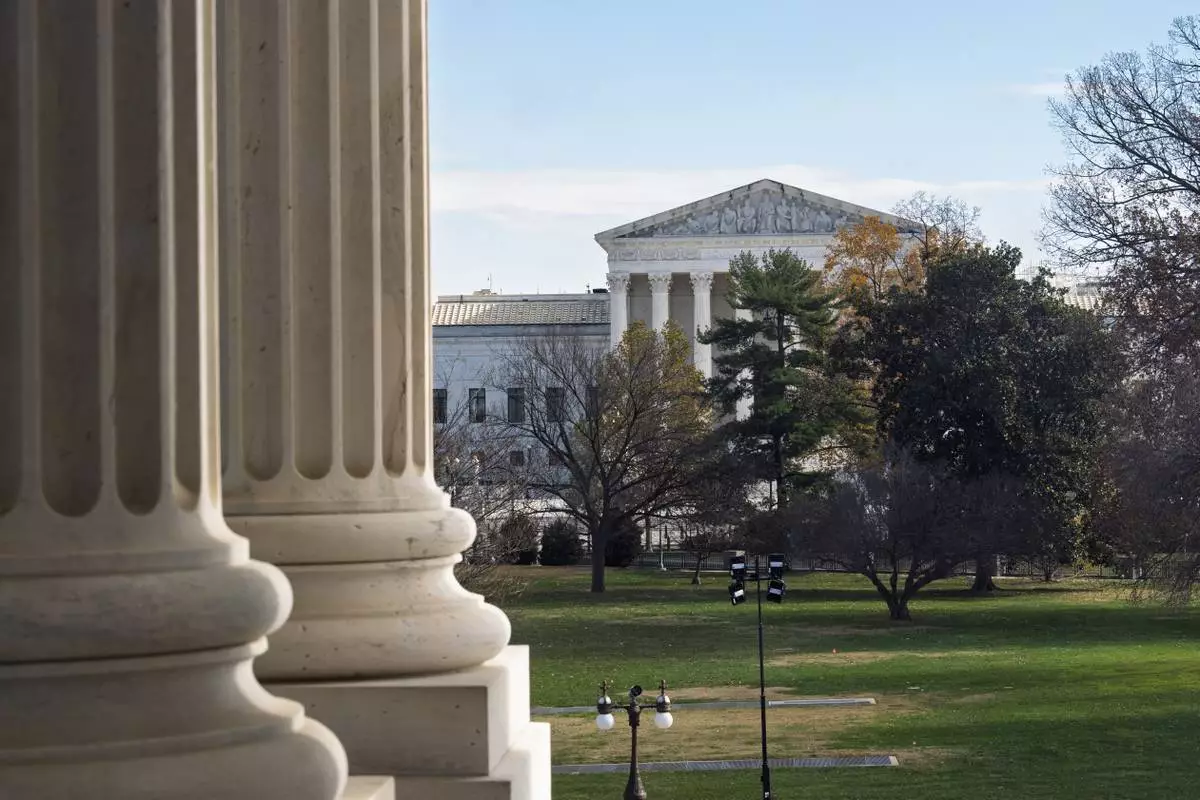
The Supreme Court is framed by the columns of the Capitol in Washington, Tuesday, Dec. 3, 2024. T (AP Photo/J. Scott Applewhite)

FILE - Advocates gather for a rally at the state Capitol complex in Nashville, Tenn., to oppose a series of bills that target the LGBTQ community, Feb. 14, 2023. (AP Photo/Jonathan Mattise, File)
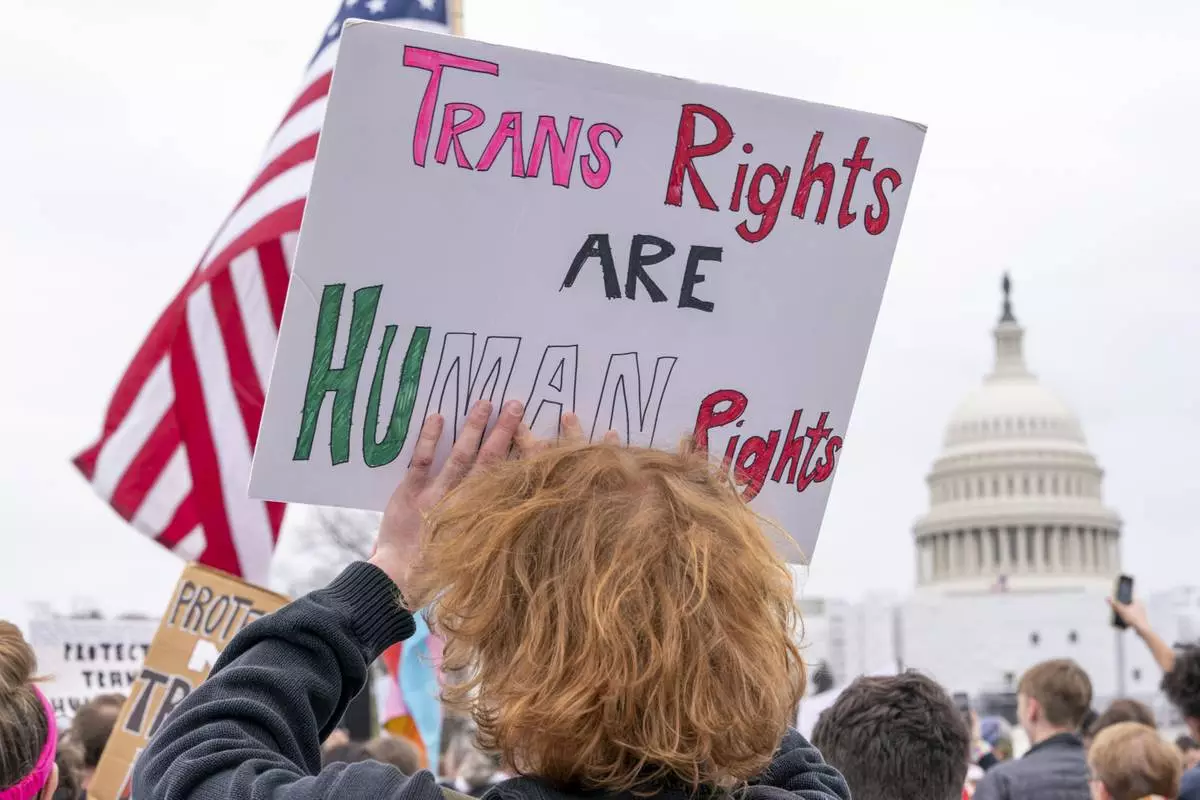
FILE - People attend a rally as part of a Transgender Day of Visibility, Friday, March 31, 2023, by the Capitol in Washington. (AP Photo/Jacquelyn Martin, File)
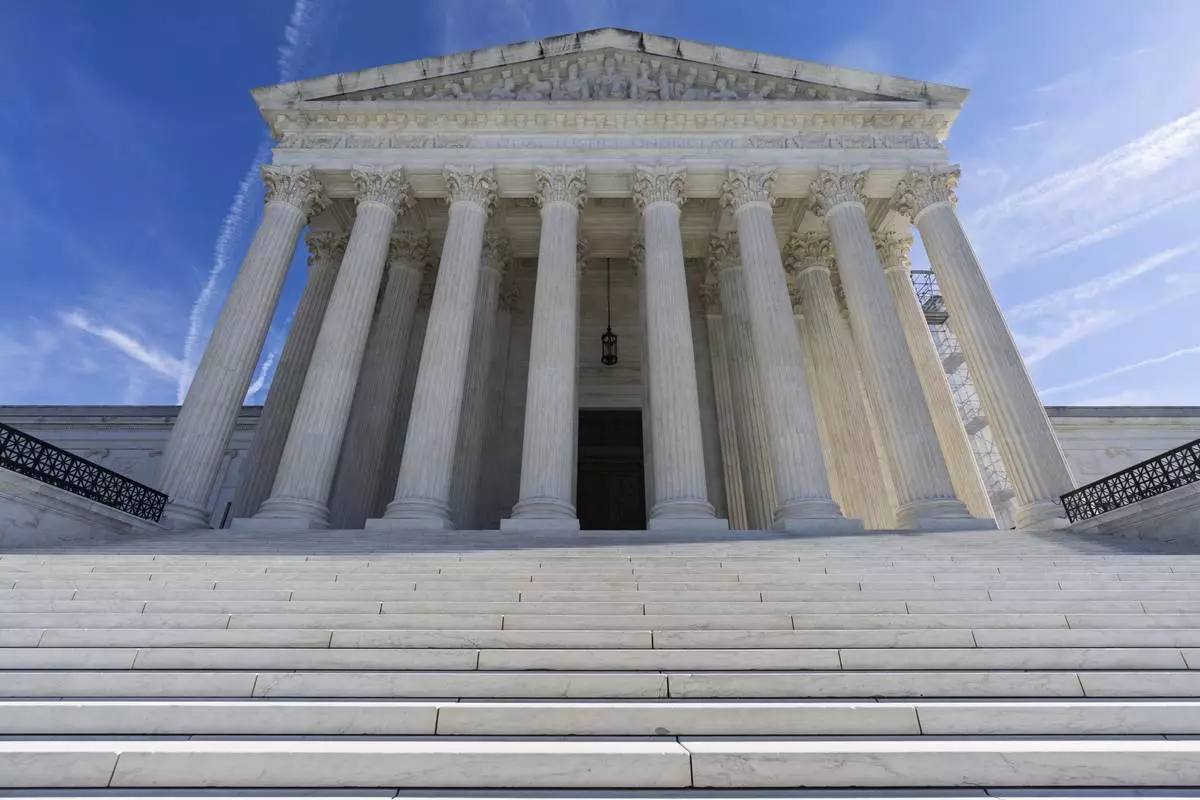
FILE - The Supreme Court is seen in Washington, Nov. 2, 2024. (AP Photo/J. Scott Applewhite, File)








